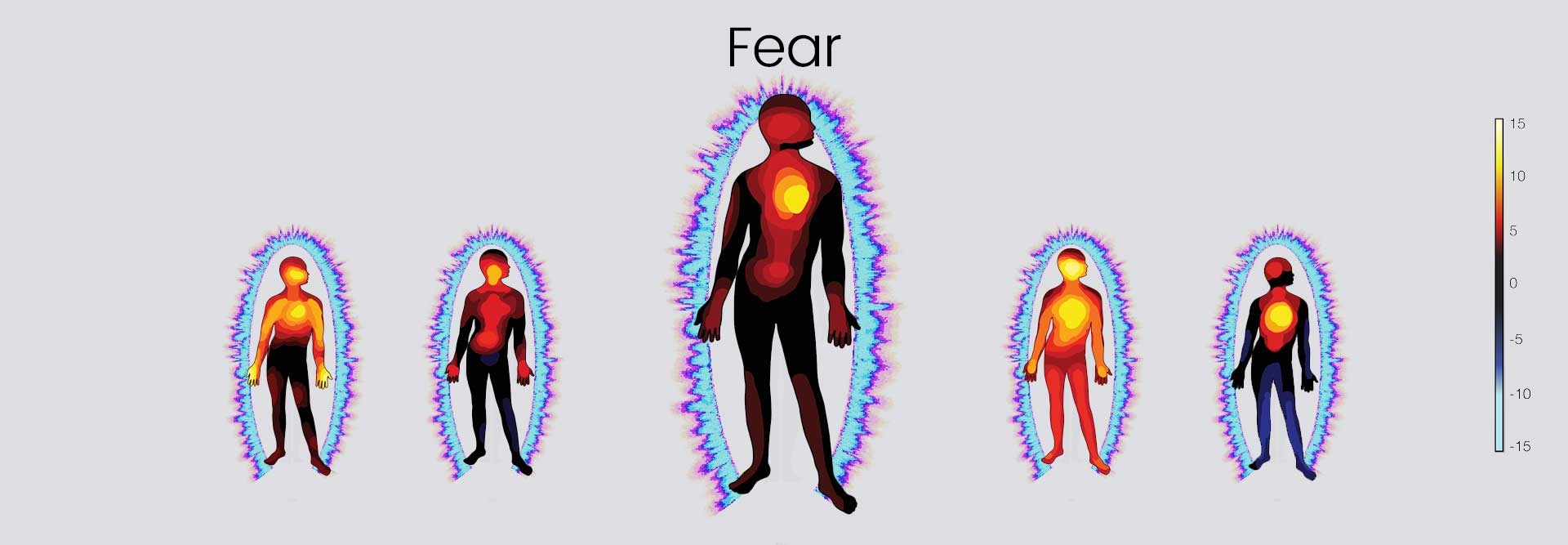Fear can be a crippling or controlling emotion
Suppressed or unresolved fears can have a debilitating effect on health and well-being. Fear can be a crippling emotion and also have a detrimental effect on our relationships, our family, friends, work, exercise and leisure activities.
At times the intensity and levels of fear you may be experiencing or feeling may be seen as irrational by yourself or others. Always remember, there is no logic to a feeling. What you are feeling is your reaction to an event or situation. The memory may have been triggered by a similar event that you may have experienced weeks, months or even years beforehand.
When your memory is triggered, you will react in the only way you know how. Your logical mind will tell you that the event that caused the original trauma can never happen again, but, at an energy level unless the level or intensity of this initial trauma is decreased and processed, each time a similar event occurs, it will trigger your fears yet again.
At times the intensity and levels of fear you may be experiencing or feeling may be seen as irrational by yourself or others. Always remember, there is no logic to a feeling. What you are feeling is your reaction to an event or situation. The memory may have been triggered by a similar event that you may have experienced weeks, months or even years beforehand.
When your memory is triggered, you will react in the only way you know how. Your logical mind will tell you that the event that caused the original trauma can never happen again, but, at an energy level unless the level or intensity of this initial trauma is decreased and processed, each time a similar event occurs, it will trigger your fears yet again.
Fears buried deep in the subconscious mind
Some fears that were caused by a severe shock, or were experienced during childhood can be buried deep in the subconscious mind, and the memories might only surface or be triggered when a similar event occurs, which could now be occurring in your adult life.
It is sometimes during a session of bio energy therapy, as the intensity of the trauma or shock is being decreased, that the person receiving therapy might suddenly say; that they had a flash-back to the initial trauma and might exclaim; that “on thinking back, it wasn’t really that bad an experience at the time”.
As a therapist I would always explain to them; that it may have been a child who had this experience and who suppressed the memory because they were unable to cope with the fears around it at the time, but you are now an adult who is remembering it, processing it and healing from the shock and trauma experienced by you as a child.
It is sometimes during a session of bio energy therapy, as the intensity of the trauma or shock is being decreased, that the person receiving therapy might suddenly say; that they had a flash-back to the initial trauma and might exclaim; that “on thinking back, it wasn’t really that bad an experience at the time”.
As a therapist I would always explain to them; that it may have been a child who had this experience and who suppressed the memory because they were unable to cope with the fears around it at the time, but you are now an adult who is remembering it, processing it and healing from the shock and trauma experienced by you as a child.
Fear as positive and healthy emotion
Fear can also be seen as positive and healthy emotion, as it can sometimes help us to survive and stay safe. It can be seen as a major factor in preventing us from taking dangerous risks that might have serious affects on our own health or on the health of others.
Fear of being hurt or injured can protect us by deterring us from walking, running or crossing a busy roadway without using a designated pedestrian crossing.
Fear of drowning can be a healthy fear and can dissuade you from attempting to swim in deep or treacherous waters, particularly if you are not a competent swimmer or capable swimmer. It can be a factor in preventing you from taking irresponsible risks in unsafe waters without safety protection or equipment.
Fear of the possible outcomes of a serious accident can prevent you from speeding or taking undue risks whilst driving a car, motorcycle or other such road vehicle.
Fear of being hurt or injured can protect us by deterring us from walking, running or crossing a busy roadway without using a designated pedestrian crossing.
Fear of drowning can be a healthy fear and can dissuade you from attempting to swim in deep or treacherous waters, particularly if you are not a competent swimmer or capable swimmer. It can be a factor in preventing you from taking irresponsible risks in unsafe waters without safety protection or equipment.
Fear of the possible outcomes of a serious accident can prevent you from speeding or taking undue risks whilst driving a car, motorcycle or other such road vehicle.
How the brain reacts when we feel fear
The emotion of fear commences in the area of the brain called the amygdala. This is a set of nuclei situated in the temporal lobe of the brain which detects levels of emotional prominence or stress when faced with a life-threatening situation or danger.
The amygdala is the area of the brain which activates particularly when threatened by a predator or other form of eminent danger, causing a fear reaction and triggers reactions throughout the human body in preparation for fight or flight. As the fear response is triggered in the amygdala there is a sudden triggering of the sympathetic nervous system and an immediate release of stress hormones.
Organs and systems necessary for survival prepare the body to react as heart rate and blood pressure increase, sending an extra supply of blood flow to muscles and limbs, breathing accelerates, the pupils dilate, and the nervous system and brain become more alert, ready for fight or flight.
The fight or flight response is necessary for survival, but when this response is triggered on a regular basis, particularly when there is no real danger, it can have a debilitating effect on the overall health and well-being of a person.
The amygdala is the area of the brain which activates particularly when threatened by a predator or other form of eminent danger, causing a fear reaction and triggers reactions throughout the human body in preparation for fight or flight. As the fear response is triggered in the amygdala there is a sudden triggering of the sympathetic nervous system and an immediate release of stress hormones.
Organs and systems necessary for survival prepare the body to react as heart rate and blood pressure increase, sending an extra supply of blood flow to muscles and limbs, breathing accelerates, the pupils dilate, and the nervous system and brain become more alert, ready for fight or flight.
The fight or flight response is necessary for survival, but when this response is triggered on a regular basis, particularly when there is no real danger, it can have a debilitating effect on the overall health and well-being of a person.
Like a mad dog locked in a shed
Fear can be like a raging mad dog locked in a shed. The dog can control you in the same way that fear does. You are afraid to open the door, because you are not sure what is really inside. You can hear the noise, you can hear the barking, but the longer you listen and do nothing and the longer it goes on, the worse it becomes.
How big is the dog? The longer he is locked up, the bigger he becomes in your mind. However, if you allow the dog to come out, you can at least see how big or small this dog really is. You are afraid to let the dog out and like fear you keep it locked up. But if you let out this dog (this fear), you can at least confront him. It is what he might do, that creates the fear. Fear locked in becomes greater and greater, but when you allow the fear out and confront it, it then loses its power.
How big is the dog? The longer he is locked up, the bigger he becomes in your mind. However, if you allow the dog to come out, you can at least see how big or small this dog really is. You are afraid to let the dog out and like fear you keep it locked up. But if you let out this dog (this fear), you can at least confront him. It is what he might do, that creates the fear. Fear locked in becomes greater and greater, but when you allow the fear out and confront it, it then loses its power.
- Fear of loss
- Fear of not having enough
- Fear of failure
- Fear of success
- Fear of change
- Fear of letting go (of a relationship, of some item in your possession, or a job)
- Fear of illness
- Fear of being close (in case of loss)
- Fear of trust
When loss is experienced, especially the loss of someone close to us, the fear of loss can create a fear of trust in case we lose again.
Fear of not having enough can cause a hoarding pattern, holding on to anything whether it be of value or not. It can also cause greed.
Fear of failure can prevent us from moving forward and being successful.
Fear of success can cause us to hold back on job promotion etc, because of the pressure and responsibility it may entail.
Fear of change can stop us moving on, expanding and taking on life’s challenges. Fear of letting go can cause a holding pattern. Holding on to our outdated belief systems, holding on to jobs, properties, families and relationships that are no longer of any learning value to us.
Fear of sickness or disease can prevent us enjoying life. This fear can be counteracted by learning stress reduction skills and techniques and self-healing techniques to help raise our immune systems, in turn assisting the body’s ability to maintain or improve health and well-being.
Fear of trust: When trust has been broken, we may have a fear of trusting again.
If you are being controlled by fear?
If you are controlling through fear?
Here is an affirmation which you can use on a regular basis:
“I will not allow myself to be controlled by fear.”
“I will not allow myself to control others through fear.”
Help is available to those who may have been living with the debilitating and sometimes paralysing effects of unresolved and suppressed emotions of fear. Holistic Bio Energy therapy has been successfully used for nearly three decades by therapists at our healing centre for emotional issues such as stress, anger, anxiety and fear.
In my experience, applying our methods of bio energy therapy techniques to the solar plexus chakra and the base chakra can be beneficial in decreasing the intensity of levels of fear that might be controlling a person’s life and health, to a level of being able to live and enjoy life to its full potential, and free of the crippling effects of fear. These bio energy healing therapy methods are available to learn on our online bio energy therapy training course.
© Patricia Hesnan, B.C.S. & Stress Management, Cert in DTM, Cert Shen Therapist, Craniosacral practitioner, Dip. Holistic.T.M. Channeler, Medium, Author.
Fear of not having enough can cause a hoarding pattern, holding on to anything whether it be of value or not. It can also cause greed.
Fear of failure can prevent us from moving forward and being successful.
Fear of success can cause us to hold back on job promotion etc, because of the pressure and responsibility it may entail.
Fear of change can stop us moving on, expanding and taking on life’s challenges. Fear of letting go can cause a holding pattern. Holding on to our outdated belief systems, holding on to jobs, properties, families and relationships that are no longer of any learning value to us.
Fear of sickness or disease can prevent us enjoying life. This fear can be counteracted by learning stress reduction skills and techniques and self-healing techniques to help raise our immune systems, in turn assisting the body’s ability to maintain or improve health and well-being.
Fear of trust: When trust has been broken, we may have a fear of trusting again.
If you are being controlled by fear?
If you are controlling through fear?
Here is an affirmation which you can use on a regular basis:
“I will not allow myself to be controlled by fear.”
“I will not allow myself to control others through fear.”
Help is available to those who may have been living with the debilitating and sometimes paralysing effects of unresolved and suppressed emotions of fear. Holistic Bio Energy therapy has been successfully used for nearly three decades by therapists at our healing centre for emotional issues such as stress, anger, anxiety and fear.
In my experience, applying our methods of bio energy therapy techniques to the solar plexus chakra and the base chakra can be beneficial in decreasing the intensity of levels of fear that might be controlling a person’s life and health, to a level of being able to live and enjoy life to its full potential, and free of the crippling effects of fear. These bio energy healing therapy methods are available to learn on our online bio energy therapy training course.
© Patricia Hesnan, B.C.S. & Stress Management, Cert in DTM, Cert Shen Therapist, Craniosacral practitioner, Dip. Holistic.T.M. Channeler, Medium, Author.

Register today and start your holistic energy healing journey straight away!


